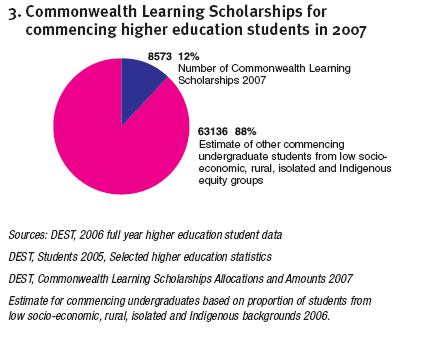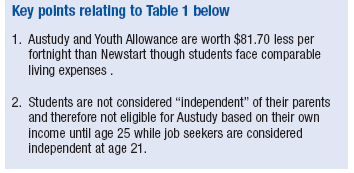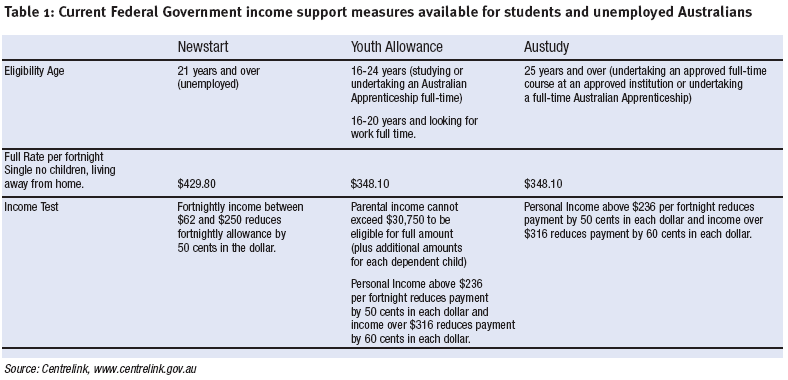|
News & Views item - November 2007 |
![]() For the Benefit of the Nation, Government Should Make Scholarships More
Equitable. (November 4, 2007)
For the Benefit of the Nation, Government Should Make Scholarships More
Equitable. (November 4, 2007)
The Group of Eight today issued its second federal election policy paper (see Group of Eight Publishes Election Policy Wish List for the first paper) this time addressing the financial constraints facing matriculating students from low socio-economic backgrounds.
As before we present their media release together with the accompanying statistical material.
|
New scholarship rules would boost equity outcomes The Group of Eight today promised to expand the provision of equity scholarships if the incoming Government commits to exempting all equity scholarships from the means test for social security payments such as Youth Allowance. “The proportion of students from low socio-economic backgrounds participating in higher education has remained static at just under 15% for more than 20 years,” said Professor Alan Robson, Chair of the Group of Eight. “Universities are hampered in their efforts to improve this situation by the treatment of non-government scholarships as personal income. “A student who is awarded a private or university scholarship can lose most of his or her Youth Allowance, because income above a certain point cuts the payment by up to 60 cents in the dollar.* This makes such scholarships almost worthless and was the reason behind the Go8’s recent decision to discontinue its equity and merit scholarship scheme. “The Government exempts its own equity scholarships from the income test but there are simply not enough of these to go around. In 2007 there were 8573 new Commonwealth scholarships available for new students, yet the Go8 estimates that some 63,000 commencing students came from equity groups.** “Exempting all equity scholarships from treatment as income would provide an incentive for universities and other non-government organisations to provide more scholarships. “The Go8 encourages both major political parties to commit to this important step to improving higher education access and equity,” Professor Robson said. The Go8 also said that a comprehensive review of student income support measures is long overdue. “Since the last review was conducted 15 years ago, many circumstances affecting the lives of students have changed,” said Professor Robson. “Recent evidence suggests that many students are living below the poverty line and working long hours in paid jobs. Forty per cent of full-time undergraduate students say that paid work adversely affects their studies and one in four are taking out private loans to help meet living costs. “The Go8 universities recognise that the capacity of students to meet day to day living expenses while studying is a key factor in ensuring fair access to higher education. While students can defer the costs of tuition through HECS HELP and FEE HELP, they cannot defer the associated living costs,” Professor Robson concluded. [Note: As of November 6 - neither Labor nor the Coalition would commit to the change, which would cost an estimated $26.5million a year, while the Australian Democrats have welcomed the call to remove retrograde taxation and income-testing rules for higher education scholarships.] *Fortnightly income over $236 and under $316 reduces a student’s Youth Allowance or Austudy benefits by 50 cents in each dollar and income over $316 reduces benefits by 60 cents in each dollar: http://www.centrelink.gov.au/internet/internet.nsf/payments/chartda.htm **Indigenous, Rural, Isolated and Low Socio Economic Status groups, see attached Go8 Backgrounder for the source of these figures. |
  |
|
  |
||
|
|
||